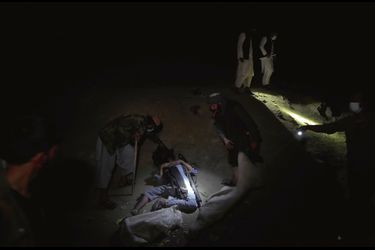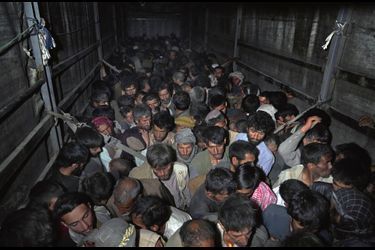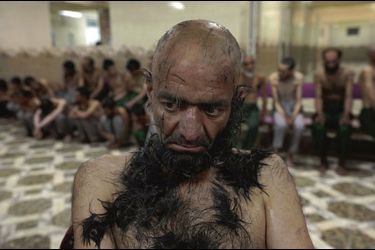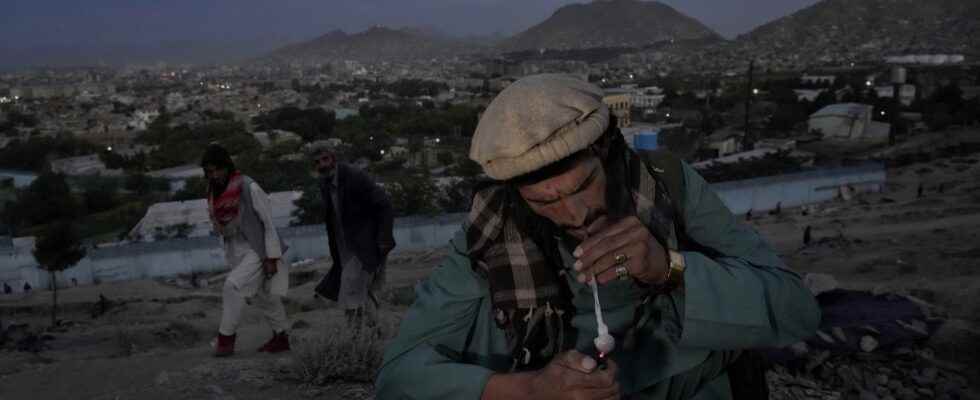Updated
In a country destroyed by forty years of war, thousands of zombies roam the ruins to forget everything.
In the dark, we can no longer distinguish human silhouettes from those of stray dogs, rolled up in a ball at their filthy feet. An audience of tangled and ghostly forms – men, women, teenagers – united in the ecstasy of getting high and more, in this devastating expectation that precedes it.
Read also: Afghan women: reportage between distress and horror
We end up glimpsing a gaunt face, a toothless mouth, a misty look, a hand gnawed by scabies, flashes of misery briefly lit by the flickering flame of a lighter. Pul-e-Sukhta, literally the “Burnt Bridge”, in the Dasht-e-Barchi district of western Kabul, is Afghanistan’s Kingdom of the Damned, living failures of this new emirate unable to deliver on its promises eradication of vice.
Read also: Hamid Karzai: “The Taliban must reconsider their decision. Girls’ education is vital.”
Crouching along the steps, clusters of zombies puff their crack pipes as their fellow victims rummage through trash cans as hurrying passers-by watch. Others wade through a trickle of yellowish river into which the city’s waste water is discharged. Many of these destitute people are former migrant workers in Iran. For years, they tried to soften the bite of exile as much as their daily toil in the fumes of opium. Back home, they have turned to heroin, now unable to work, devoured by the shame that keeps them away from these families for which they have nevertheless sacrificed everything.
In the west of the capital. When a junkie succumbs to an overdose, his neighbors, equally stoned men and dogs, don’t even notice.
© Ebrahim Noroozi/AP/SIPA
Ghazi, black turban and long gray beard, has devoted half his life to jihad, first against the Russians, then against the Americans. Arrested in the aftermath of September 11, the old mujahideen languished for several years in Guantanamo jails before being transferred to Bagram prison, where he modestly confides that he was tortured. Taken by pity, an American soldier gave him a daily dose of opium to relieve his suffering. Upon his release, Ghazi remained captive to this black ball which governs his existence and whose quest occupies him entirely.
At 82, he has nothing but a slew of painful memories and that manly pride of a veteran telling him to swallow his sobs in front of strangers. “In other countries, veterans are heroes, he sighs between two puffs of a joint, for lack of anything better that day. They become generals or receive a pension. I have only this hill for my only home.” Before disappearing, the old man lets out this terrible sentence: “I have never known a single day of happiness in my long existence.”
Originally, the drug was intended to weaken the degenerate West; today, it is used to ransom him
Further on, Nazer wanders with the authority of a “malek” between the tents set up under the bridge. He stops to speak to a woman hidden behind a veil from which escape vapors of “shishah” (literally “glass”), methamphetamine prized for its low cost. Then he interposes himself between two men, made violent by lack, who allow themselves to be lectured. Nazer has a different status: he owns a house, which gives him a certain prestige. The 30-year-old rented his arms for the day on construction sites for a long time, before drugs made him unable to do so. From now on, he prefers to spend his nights in this open cesspool, often accompanied by his 13-year-old daughter and his 8-year-old son, both drug addicts. The father says he gave them opium from an early age to calm their crying, which he couldn’t bear. “We have all become addicted to our own poison,” he observes, surprisingly lucid.

“Cleaning” operation. To escape the militiamen, some try to hide under the rubbish.
© Ebrahim Noroozi/AP/SIPA
Originally intended to weaken the decadent West, drugs are claiming more and more victims in Afghanistan. According to the UN, nearly 4 million people are now trapped in addiction, ie 10% of the population. Decades of war, a catastrophic economic situation, the return to moral order… there are plenty of reasons for wanting to forget everything. These cohorts of drug addicts find themselves in the sights of the authorities. They represent one of the embarrassing elements of society, like badly veiled women, whom they seem determined to erase from the landscape.
From the first days of its recovery, last August, the emirate launched a violent policy of repression against consumers. A sign of the importance of the subject, drug problems have been entrusted to the all-powerful Ministry of the Interior. Patrols armed with whips and rifles tirelessly raid landmarks known to all, unceremoniously shaking the amorphous silhouettes before loading them into ambulances or aboard cattle trucks. Direction the rehabilitation service of the Ibn Sina hospital, installed on a former military base, where a thousand people are crammed.

Transport by “cattle truck”. At the beginning of June, the Taliban round up 1,500 drug addicts in two nights.
© Ebrahim Noroozi/AP/SIPA
All the beds are occupied and are always full. Some sleep on the floor. Dressed in identical blue outfits in which lean bodies float, with shaved heads, the residents evoke less sick people in care than prisoners of a concentration camp with the look of a hunted animal. Within these walls, out of sight, violence is the norm. Team leaders reign supreme. A corpse can rot in general indifference… Most follow forced stays, barely interspersed with a few days of freedom during which they instantly relapse. Before being locked up again for forty-five days, the duration of the compulsory cure during which they are weaned with little or no substitute products. Drug stocks are almost exhausted, staff have not been paid for a year.
Nothing will work out: the manna of the poppy is the last available to the government
“We don’t even have enough to feed these men properly anymore,” breathes Dr. Zalmel, who oversees the country’s various detoxification centers. The problem is that the authorities are arresting more than we can treat.” The doctor experiences the discouraging sensation of emptying the sea with a teaspoon, torn between the need to warn about the dramatic situation and the fear of incurring the wrath of the regime. Presented as a success, these repeated raids demonstrate above all the inability of the Islamists to curb an endemic phenomenon, while international aid has been suspended. “Before, we received 10 million dollars each year to fight against addiction problems. Not a penny has reached us for a year.” Dr. Zalmel castigates this West, which is quick to be moved by the reduction of freedoms in a country abandoned to its fate: “We are being drummed into our ears with respect for human rights, but aren’t drug addicts human beings? humans? Don’t they have rights too?

Armed with a cudgel, the nurse sends a “patient” to the shower as soon as he arrives at Ibn Sina hospital.
© Ebrahim Noroozi/AP/SIPA
Officially, the Taliban have pledged to eradicate the lucrative poppy crop, which largely financed their war effort when they were insurgents and of which Afghanistan is the world’s largest producer. According to a UN report, its trade would have brought in 460 million dollars in 2020. But on this question, as on so many others, the new masters of the country are cultivating ambiguity. Rather than give up this windfall, one of the few they currently have, they have made the painless choice to focus their efforts on consumers – marginalized people who nobody cares about. If they assured that they would tackle the production chain in a second step, in fact, more and more farmers and landowners are turning to this less water-intensive and much more profitable crop.

Mowing. These men will be locked up here for a month and a half, without the slightest care and barely fed.
© Ebrahim Noroozi/AP/SIPA
In the Kandahar region, ravaged by an unprecedented drought, the peasants without hesitation shave the old pomegranate trees, the pride of the region, to replace them with this pink plant which yields up to seven times more. A kilo of opium trading at around 90 dollars, the calculation is quick… The time seems long gone when the international community financed programs of substitution cultivation, dreaming of exchanging poppy fields for flowerbeds. Preexisting for a long time, this problem is one of the rare scourges that cannot be attributed to the Taliban alone. But the collapse of the economy caused by their return to power, as well as the proliferation of trafficking in methamphetamines made from ephedra, a small shrub from the Afghan mountains, only worsen a situation that seems out of control. . Purposely?
On condition of anonymity, a security officer confides that the authorities would allow drug trafficking to prosper in order to use it as a bargaining lever. The goal seems obvious: a resumption of international aid against the promise to stem it. A strategy of chaos which the Taliban have used extensively to take over the reins of the country, and which they master to perfection.
Find all the photos of this report in our magazine and in the digital edition
